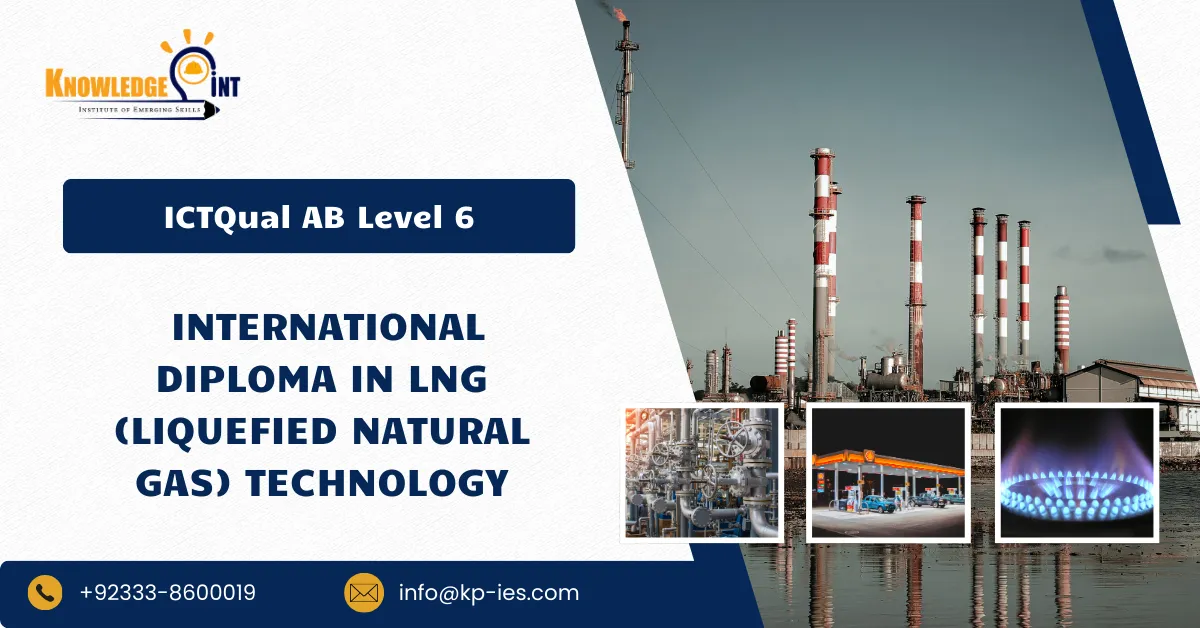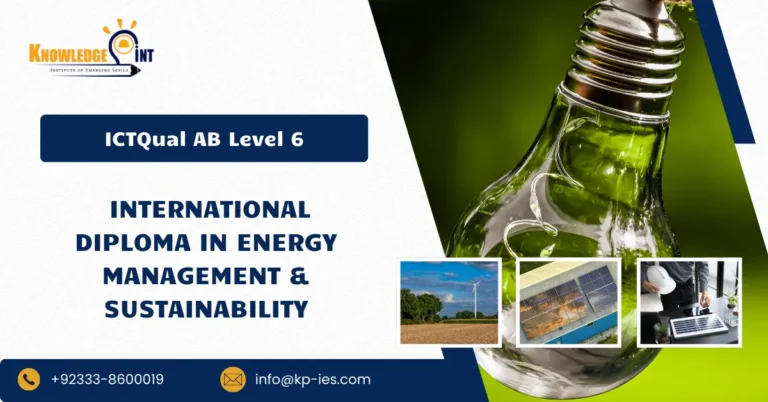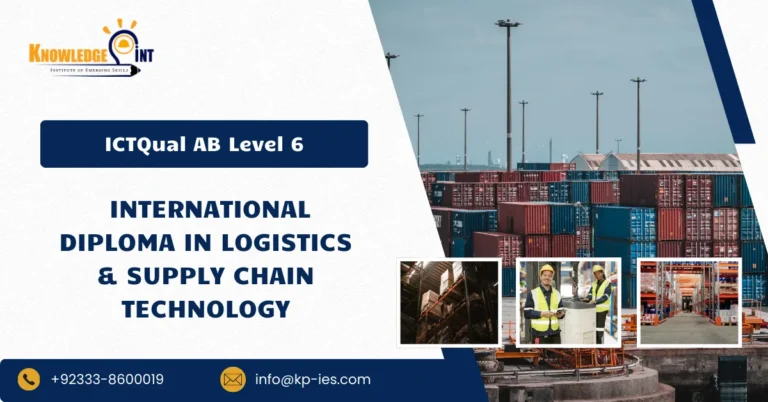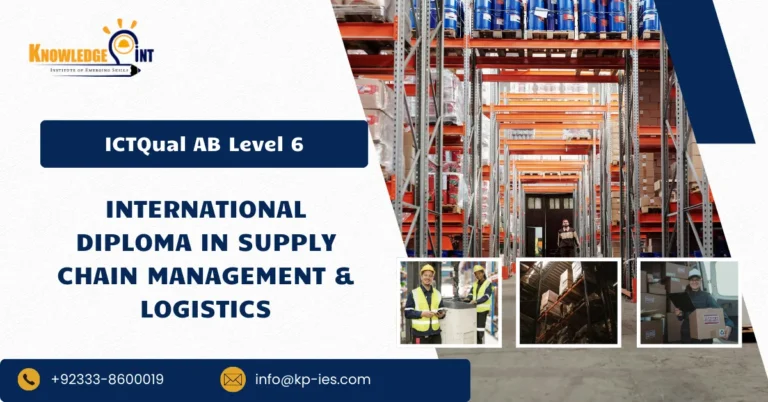The ICTQual AB Level 6 International Diploma in LNG Technology is a prestigious and globally recognized qualification, designed for professionals seeking to specialize in the rapidly growing liquefied natural gas (LNG) industry. This advanced program equips learners with the technical knowledge, practical skills, and leadership abilities required to excel in the dynamic field of LNG production, storage, transportation, and plant management.
Structured over three years with 36 mandatory units, the diploma offers a comprehensive learning journey, covering foundational, intermediate, and advanced aspects of LNG technology. In the first year, learners gain a solid understanding of chemical and process engineering principles, LNG properties, cryogenic fundamentals, and plant equipment. Year two focuses on intermediate skills, including advanced liquefaction processes, gas pretreatment, process automation, energy management, and safety practices. In the final year, students develop advanced expertise in plant optimization, project management, risk assessment, and strategic decision-making, culminating in a capstone project that integrates knowledge across all areas.
The program emphasizes practical application and industry readiness, combining theoretical knowledge with hands-on learning through laboratory techniques, simulation software, and real-world case studies. Students also gain critical skills in safety management, environmental sustainability, and regulatory compliance, ensuring they can operate efficiently and responsibly in global LNG operations.
Course Overview
This qualification, the ICTQual AB Level 6 International Diploma in LNG (Liquefied Natural Gas) Technology, consists of 36 mandatory units.
Year 1 – Foundation in LNG Technology
- Principles of Chemical and Process Engineering
- Introduction to Liquefied Natural Gas (LNG)
- Natural Gas Properties and Analysis
- LNG Production Processes Overview
- Cryogenic Principles and Applications
- Heat and Mass Transfer in LNG Systems
- Introduction to LNG Plant Equipment and Technology
- Process Instrumentation and Control Basics
- Health, Safety, and Environmental Awareness
- Industrial Laboratory Techniques
- Technical Report Writing
- Introduction to LNG Simulation Software
Year 2 – Intermediate LNG Technology
- Advanced LNG Liquefaction Processes
- Gas Pretreatment and Sweetening Techniques
- Refrigeration Cycles and Cryogenic Operations
- Process Control and Automation in LNG Plants
- Energy Management and Efficiency in LNG Operations
- LNG Storage and Tank Design
- Process Safety Management and Hazard Analysis
- LNG Transportation and Pipeline Technology
- Quality Control and Assurance in LNG Production
- Environmental Management and Sustainability
- LNG Blending and Product Optimisation
- Data Analysis and Technical Communication
Year 3 – Advanced LNG Technology
- Advanced LNG Plant Optimisation and Troubleshooting
- LNG Project Management and Planning
- Advanced Cryogenic Engineering and Heat Exchangers
- LNG Process Simulation and Modelling
- Corrosion, Maintenance, and Reliability in LNG Systems
- Energy Transition and Cleaner LNG Technologies
- Risk Assessment and Emergency Response
- Advanced Laboratory Techniques and Process Testing
- Supply Chain and Logistics in LNG Operations
- Capstone Project in LNG Technology
- Professional Development and Leadership in Energy
- Strategic Decision-Making in LNG Plant Management
Learning Outcomes – ICTQual AB Level 6 International Diploma in LNG (Liquefied Natural Gas) Technology
Year 1 – Foundation in LNG Technology
- Principles of Chemical and Process Engineering
- Understand chemical and process engineering fundamentals.
- Apply mass and energy balance principles.
- Recognize applications in LNG operations.
- Introduction to Liquefied Natural Gas (LNG)
- Understand LNG production and supply chains.
- Identify global market trends.
- Recognize operational and safety requirements.
- Natural Gas Properties and Analysis
- Analyze physical and chemical properties.
- Perform gas composition analysis.
- Evaluate gas quality for liquefaction.
- LNG Production Processes Overview
- Identify stages of LNG production.
- Understand process integration.
- Recognize equipment and flow in LNG plants.
- Cryogenic Principles and Applications
- Apply low-temperature thermodynamics.
- Analyze effects on materials and processes.
- Use cryogenic principles in LNG systems.
- Heat and Mass Transfer in LNG Systems
- Apply heat and mass transfer in cryogenic systems.
- Optimize efficiency in heat exchangers.
- Solve operational challenges.
- Introduction to LNG Plant Equipment and Technology
- Identify and understand LNG equipment.
- Analyze operational functions of compressors, storage tanks, and heat exchangers.
- Recognize trends in LNG technology.
- Process Instrumentation and Control Basics
- Apply instrumentation and basic control strategies.
- Monitor process stability and safety.
- Understand automation integration.
- Health, Safety, and Environmental Awareness
- Apply safety regulations in LNG operations.
- Assess environmental impacts.
- Promote sustainable practices.
- Industrial Laboratory Techniques
- Conduct laboratory testing for LNG operations.
- Maintain accuracy and safety standards.
- Interpret lab results for operational decisions.
- Technical Report Writing
- Prepare professional reports.
- Present complex technical data effectively.
- Apply industrial documentation standards.
- Introduction to LNG Simulation Software
- Apply basic simulation software for LNG processes.
- Model process scenarios.
- Optimize plant operations.
Year 2 – Intermediate LNG Technology
- Advanced LNG Liquefaction Processes
- Apply advanced liquefaction techniques.
- Optimize plant efficiency.
- Troubleshoot liquefaction units.
- Gas Pretreatment and Sweetening Techniques
- Purify natural gas for liquefaction.
- Remove contaminants such as CO₂ and H₂S.
- Ensure gas meets quality standards.
- Refrigeration Cycles and Cryogenic Operations
- Apply refrigeration cycle principles.
- Operate and optimize cryogenic systems.
- Troubleshoot refrigeration performance.
- Process Control and Automation in LNG Plants
- Implement automation in plant operations.
- Monitor processes digitally.
- Ensure efficiency and safety.
- Energy Management and Efficiency in LNG Operations
- Monitor energy consumption.
- Apply energy-saving techniques.
- Promote sustainable operations.
- LNG Storage and Tank Design
- Design cryogenic storage tanks.
- Apply safety and operational standards.
- Ensure integrity and performance.
- Process Safety Management and Hazard Analysis
- Implement process safety management systems.
- Conduct hazard identification and risk assessment.
- Apply preventive measures for safe operations.
- LNG Transportation and Pipeline Technology
- Understand LNG transport logistics.
- Apply safety protocols in shipping and pipelines.
- Manage pipeline integrity and flow assurance.
- Quality Control and Assurance in LNG Production
- Apply QA/QC standards.
- Monitor LNG product quality.
- Ensure compliance with regulations.
- Environmental Management and Sustainability
- Implement environmental management systems.
- Reduce emissions and environmental footprint.
- Apply sustainable energy practices.
- LNG Blending and Product Optimisation
- Optimize LNG composition.
- Ensure product meets specifications.
- Apply blending techniques efficiently.
- Data Analysis and Technical Communication
- Analyze operational data.
- Communicate findings effectively.
- Support decision-making in LNG operations.
Year 3 – Advanced LNG Technology
- Advanced LNG Plant Optimisation and Troubleshooting
- Optimize plant performance.
- Identify and solve operational issues.
- Enhance reliability and efficiency.
- LNG Project Management and Planning
- Apply project management principles.
- Develop schedules and resource plans.
- Monitor project budgets and progress.
- Advanced Cryogenic Engineering and Heat Exchangers
- Design advanced cryogenic systems.
- Optimize heat exchangers.
- Evaluate materials for low-temperature operations.
- LNG Process Simulation and Modelling
- Use simulation software for advanced modeling.
- Optimize production and transport scenarios.
- Evaluate plant performance digitally.
- Corrosion, Maintenance, and Reliability in LNG Systems
- Identify corrosion mechanisms.
- Apply preventive maintenance.
- Ensure operational reliability.
- Energy Transition and Cleaner LNG Technologies
- Apply low-carbon and clean LNG technologies.
- Reduce environmental impact.
- Integrate sustainable practices.
- Risk Assessment and Emergency Response
- Conduct advanced risk assessment.
- Develop emergency response plans.
- Ensure compliance with safety standards.
- Advanced Laboratory Techniques and Process Testing
- Perform complex lab testing.
- Ensure data accuracy.
- Apply results in operations.
- Supply Chain and Logistics in LNG Operations
- Optimize supply chain and logistics.
- Manage storage, shipping, and distribution.
- Improve operational efficiency and cost control.
- Capstone Project in LNG Technology
- Integrate knowledge into a real-world project.
- Solve technical and operational challenges.
- Demonstrate professional competence.
- Professional Development and Leadership in Energy
- Develop leadership and team management skills.
- Plan career growth in LNG and energy sectors.
- Foster collaboration in technical projects.
- Strategic Decision-Making in LNG Plant Management
- Apply strategic planning frameworks.
- Make informed operational and management decisions.
- Lead high-performance LNG teams.
Course Benefits of ICTQual AB Level 6 International Diploma in LNG (Liquefied Natural Gas) Technology
- Provides in-depth technical knowledge of LNG processes and cryogenic systems.
- Equips learners with advanced safety, risk assessment, and emergency management skills.
- Enhances understanding of energy efficiency, sustainability, and cleaner LNG technologies.
- Develops project management, leadership, and strategic decision-making skills.
- Offers practical training in simulation software, laboratory techniques, and real-world applications.
- Improves employability in LNG plants, shipping, pipelines, and energy firms.
- Strengthens problem-solving, analytical, and communication skills.
- Prepares graduates for leadership roles in the global LNG industry.
- Provides internationally recognized certification in a high-demand energy sector.
- Opens pathways for further academic study or professional certifications.
After completing this course, learners can progress in the following ways:
- Progress to Master’s degrees in LNG Technology, Petroleum Engineering, or Energy Management.
- Obtain professional certifications such as NEBOSH LNG Safety, SPE LNG Specialist, or IChemE accreditation.
- Pursue careers as LNG Process Engineer, Cryogenic Engineer, Plant Operations Manager, HSE Specialist, Supply Chain Coordinator, or Project Manager.
- Work with global LNG companies, EPC contractors, shipping firms, and energy consultancies.
- Advance into strategic leadership roles in plant management, LNG project planning, or energy transition projects.
- Transition into research and innovation focusing on clean LNG technologies and sustainable energy solutions.







